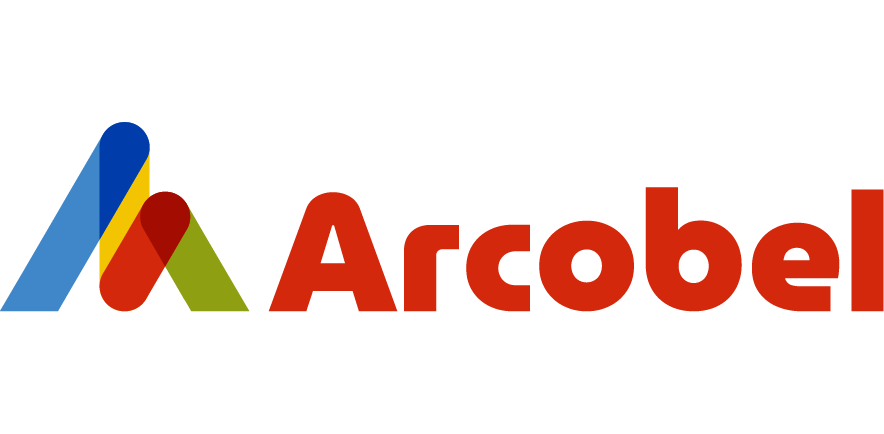Want to speak to someone directly?
Use the chat at the bottom right (during office hours) to get in touch with an expert directly.
-
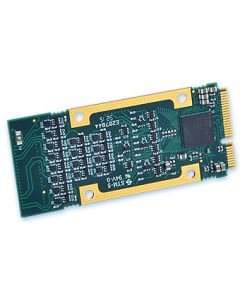 AcroPack Module: 32 bidirectional input/output channels
AcroPack Module: 32 bidirectional input/output channels- Fabrikant: Acromag
- Storage temperature: -40 to 125°C
SKU: AP408E-LF
Price on request -
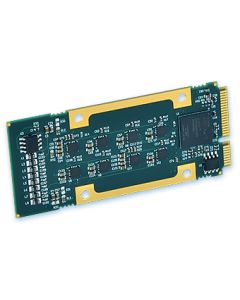 AcroPack 12-bit DAC module 16 analog voltage output.
AcroPack 12-bit DAC module 16 analog voltage output.- Fabrikant: Acromag
- Storage temperature: -55 to 150°C
SKU: AP220-16E-LF
Price on request -
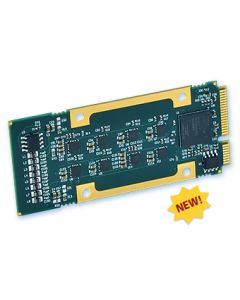 AcroPack 12-bit DAC module 8x isolated voltage outputs
AcroPack 12-bit DAC module 8x isolated voltage outputs- Fabrikant: Acromag
- Storage temperature: -55 to 150°C
SKU: AP226-8E-LF
Price on request -
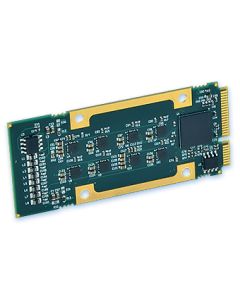 AcroPack 16-bit DAC module 16x non-isolated voltage outputs
AcroPack 16-bit DAC module 16x non-isolated voltage outputs- Fabrikant: Acromag
- Storage temperature: -55 to 150°C
SKU: AP231-16E-LF
Price on request -
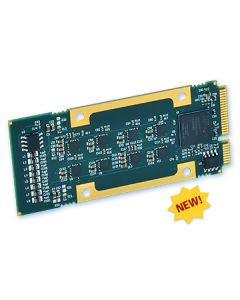 AcroPack 16-bit DAC module 8x isolated voltage outputs
AcroPack 16-bit DAC module 8x isolated voltage outputs- Fabrikant: Acromag
- Storage temperature: -55 to 150°C
SKU: AP236-8E-LF
Price on request -
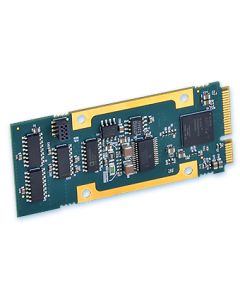 AcroPack 16-bit mod. 20x diff- / 40x single-ended inputs
AcroPack 16-bit mod. 20x diff- / 40x single-ended inputs- Fabrikant: Acromag
- Storage temperature: -40 to 85°C
SKU: AP323E-LF
Price on request -
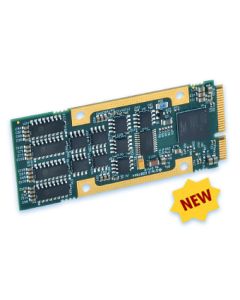 AcroPack 14-bit ADC module simultaneous sample and hold
AcroPack 14-bit ADC module simultaneous sample and hold- Fabrikant: Acromag
- Storage temperature: -55 to 150°C
SKU: AP341E-LF
Price on request -
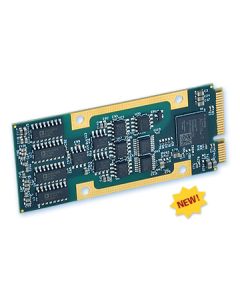 Acropack 14-bit AD mod. simultaneous multi-channel 12 inputs
Acropack 14-bit AD mod. simultaneous multi-channel 12 inputs- Fabrikant: Acromag
- Storage temperature: -55 to 150°C
SKU: AP342E-LF
Price on request -
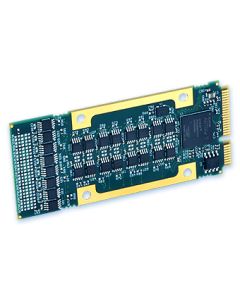 AcroPack TTL IO counter/timer module with ten 32-bit counter
AcroPack TTL IO counter/timer module with ten 32-bit counter- Fabrikant: Acromag
- Storage temperature: -55 to 150°C
SKU: AP482E-LF
Price on request -
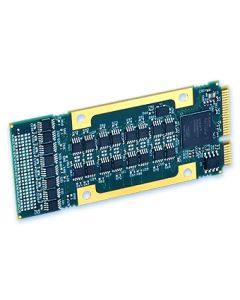 AcroPack TTL IO counter/timer module with eight 32-bit count
AcroPack TTL IO counter/timer module with eight 32-bit count- Fabrikant: Acromag
- Storage temperature: -55 to 150°C
SKU: AP483E-LF
Price on request -
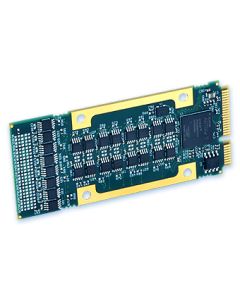 AcroPack RS422 counter/timer module with six 32-bit counters
AcroPack RS422 counter/timer module with six 32-bit counters- Fabrikant: Acromag
- Storage temperature: -55 to 150°C
SKU: AP484E-LF
Price on request -
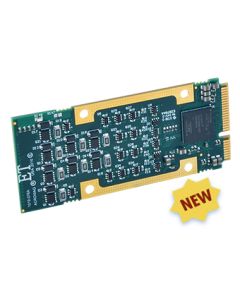 AcroPack Source/Sink Digital Input/Output Module 16 Channel
AcroPack Source/Sink Digital Input/Output Module 16 Channel- Fabrikant: Acromag
- Storage temperature: -40 to 125°C.
SKU: AP418E-LF
Price on request

Industrial PCs, computer-on-modules (COMs) or single board computers already have various I/O options as standard. However, to realize the communication between your industrial PC and your industrial equipment, you sometimes cannot avoid adding extra I/O functions to your system.
In our range you will find a wide variety of standard I/O insert cards. These solutions can be used for analog I/O, digital I/O, fieldbus communication and serial communication. Some of these plug-in cards also feature a Xilinx FPGA, which allows programming certain I/O functions. This allows a plug-in card to be used for a specific task.
To be able to integrate an I/O plug-in card into your embedded system, you need a carrier card in certain cases. This depends entirely on the standard form factor of your plug-in card. Some carrier cards even offer the possibility to integrate different I/O functions simultaneously into your industrial PC. We supply different types of carrier cards, through which we can always offer you a suitable I/O solution.
With the product lines of Abaco, Arcomag, MEN (duagon) and Tews we can meet all your I/O communication needs. Below you will find a selection from our standard range. In addition to standard solutions, you can also contact Arcobel for the development of customer-specific I/O solutions. Feel free to contact us for more options, we are happy to advise you.
With the advent of high speed data transfer, a serial interface is a suitable choice for long distance communication. These interfaces can convert serial-to-parallel and parallel-to-serial, or in some cases provide a basic data protocol.
RS-232 is a serial interface that connects Data Terminal Equipment (DTE) with Data Communication Equipment (DTE). This serial interface can also be used to connect industrial embedded PCs to video terminals, computers and modems.
RS-422 and RS-485 are just like RS-232 serial interfaces. However, these interfaces can transmit data at a higher speed over a longer distance. The bus structure allows multiple devices to communicate with each other. These interfaces are also less susceptible to interference due to the use of differential voltages.
By equipping your industrial PC with an RS232/422/485 communication module, your embedded system can communicate with industrial equipment through serial communication.
CAN is a fieldbus that is used for many industrial applications. This fieldbus is specifically designed for environments with high electromagnetic disturbances and uses two differential driven lines. A CAN bus enables real-time communication. Each node has a fixed priority and the message of the highest priority node takes precedence.
Profibus is another fieldbus that is widely used in industry. In the process industry, analog signals are used. The Profibus-PA variant is used in these types of situations to control equipment and exchange data. The Profibus-DP variant is used for environments where digital signals are often used for controlling equipment.
Other fieldbuses are used in (military) aviation. MIL-STD-1553, for example, is such a fieldbus. The military standard is specified by the United States Department of Defense. This fieldbus was originally developed as a military avionics data bus. MIL-STD-1553 has the same mechanism, functionality and the same electronic properties as a serial data bus. Today, this fieldbus is also used in aerospace for on-board data handling (OBDH).
ARINC is another fieldbus used in aviation. The abbreviation stands for Aeronautical Radio INC. (ARINC). The standard is generally used in high-end commercial aircraft and transport aircraft. The standard uses a self-clocking, self-synchronizing data protocol. The protocol is an alternative to MIL-STD-1553.
At Arcobel.com you will find various plug-in cards that are equipped with fieldbus communication. For example, you can provide your industrial PC with CAN bus interfaces, a Profibus controller or high density ARINC429 & MIL-STD-1553 interfaces.
You can contact Arcobel for various PCIe modules for the most diverse applications. For example, we supply high density interface board solution for MIL-STD-1553 based on PCIe. We also have XMC PCIe plug-in cards in our range, equipped with a Xilinx FPGA. In addition, we also supply compatible XMC PCIe carrier boards.
CompactPCI Serial boards are equipped with various connectors, which enable high data rates through PCI Express. Additional high speed interfaces such as Ethernet, SATA and USB are all supported as well.
We supply Compact PCI Serial interface boards and Compact PCI Serial carrier boards for the most diverse applications. Thanks to the modular 19”design, our engineers can develop a fully custom I/O solution for you.
To be able to integrate an M-Module into your industrial PC, you need an M-Module carrier board. This Compact PCI Serial 3U carrier board establishes a connection to your embedded system via PCIe.
Today, XMC is becoming increasingly popular. This is because advanced I/O functions are increasingly being used for industrial and military applications. XMC plug-in cards often come with a Field-Programmable Gate Array (FPGA). The FPGA is an integrated circuit consisting of programmable logic components. This allows the desired I/O functions to be programmed to perform a specific task.
In our range you will find a wide variety of standard I/O insert cards. These solutions can be used for analog I/O, digital I/O, fieldbus communication and serial communication. Some of these plug-in cards also feature a Xilinx FPGA, which allows programming certain I/O functions. This allows a plug-in card to be used for a specific task.
To be able to integrate an I/O plug-in card into your embedded system, you need a carrier card in certain cases. This depends entirely on the standard form factor of your plug-in card. Some carrier cards even offer the possibility to integrate different I/O functions simultaneously into your industrial PC. We supply different types of carrier cards, through which we can always offer you a suitable I/O solution.
With the product lines of Abaco, Arcomag, MEN (duagon) and Tews we can meet all your I/O communication needs. Below you will find a selection from our standard range. In addition to standard solutions, you can also contact Arcobel for the development of customer-specific I/O solutions. Feel free to contact us for more options, we are happy to advise you.
A suitable I/O module for every I/O type
At Arcobel.com you will find different types of I/O interface plug-in cards, based on different communication forms. With the help of these I/O interface plug-in cards, an industrial PC can control or read out other application-related equipment.Digital signals
Digital input signals only display 2 situations, such as on or off. In most cases, digital output signals are used to check the on/off status of a device. These digital signals can only be read by digital I/O modules.Analog signals
Analog signals are variable and can take multiple status forms. In this case you can think of the temperature or the status level of a device. Analog output signals are variable, just like analog input signals. This output can be used, for example, to open a valve in a desired position. By integrating an analog I/O module into your industrial PC, analog signals can be read out.Ethernet
In the current industry 4.0 era, an Ethernet connection is used for various applications, such as: virtualization, High-Performance Computing (HPC), Big Data and Machine Learning. To connect an industrial PC to an Ethernet network, the embedded system will have to be equipped with a Network Interface Controller.Serial Communication
Serial communication uses one or two transmission lines to send and receive data. The data output is sent and received per bit on a continuous basis. Most industrial production equipment uses serial interfaces.With the advent of high speed data transfer, a serial interface is a suitable choice for long distance communication. These interfaces can convert serial-to-parallel and parallel-to-serial, or in some cases provide a basic data protocol.
RS-232 is a serial interface that connects Data Terminal Equipment (DTE) with Data Communication Equipment (DTE). This serial interface can also be used to connect industrial embedded PCs to video terminals, computers and modems.
RS-422 and RS-485 are just like RS-232 serial interfaces. However, these interfaces can transmit data at a higher speed over a longer distance. The bus structure allows multiple devices to communicate with each other. These interfaces are also less susceptible to interference due to the use of differential voltages.
By equipping your industrial PC with an RS232/422/485 communication module, your embedded system can communicate with industrial equipment through serial communication.
Fieldbus Communication
A fieldbus is an industrial digital bus for real-time control of machines and processes. A typical process where a fieldbus is used is the exchange of data between sensors, a PLC, control computers and actuators. Fieldbuses ensure trouble-free communication.CAN is a fieldbus that is used for many industrial applications. This fieldbus is specifically designed for environments with high electromagnetic disturbances and uses two differential driven lines. A CAN bus enables real-time communication. Each node has a fixed priority and the message of the highest priority node takes precedence.
Profibus is another fieldbus that is widely used in industry. In the process industry, analog signals are used. The Profibus-PA variant is used in these types of situations to control equipment and exchange data. The Profibus-DP variant is used for environments where digital signals are often used for controlling equipment.
Other fieldbuses are used in (military) aviation. MIL-STD-1553, for example, is such a fieldbus. The military standard is specified by the United States Department of Defense. This fieldbus was originally developed as a military avionics data bus. MIL-STD-1553 has the same mechanism, functionality and the same electronic properties as a serial data bus. Today, this fieldbus is also used in aerospace for on-board data handling (OBDH).
ARINC is another fieldbus used in aviation. The abbreviation stands for Aeronautical Radio INC. (ARINC). The standard is generally used in high-end commercial aircraft and transport aircraft. The standard uses a self-clocking, self-synchronizing data protocol. The protocol is an alternative to MIL-STD-1553.
At Arcobel.com you will find various plug-in cards that are equipped with fieldbus communication. For example, you can provide your industrial PC with CAN bus interfaces, a Profibus controller or high density ARINC429 & MIL-STD-1553 interfaces.
PCIe
PCI Express stands for Peripheral Component Interconnect Express (PCIe). PCIe is a standard for plug-in cards that occurs in both industrial embedded PCs and commercial PCs. This standard supports PCIe plug-in cards of up to 300 watts, 75 watts from the PCIe slot. A PCIe slot also includes a PCIe bus. There is a PCI slot at the end of each PCIe bus. The existing PCI slots are intended for plug-in cards. The PCIe standard replaces two older plug-in card standards, namely: PCI and AGP.You can contact Arcobel for various PCIe modules for the most diverse applications. For example, we supply high density interface board solution for MIL-STD-1553 based on PCIe. We also have XMC PCIe plug-in cards in our range, equipped with a Xilinx FPGA. In addition, we also supply compatible XMC PCIe carrier boards.
miniPCIe
The PCI Express Mini Card, also known as mPCIe or Mini PCIe, is a compact form factor for PCI Express devices. Due to its compact and rugged design, the standard is ideal for embedded systems in industrial and military environments. A carrier board or SBC can be implemented with mPCIe modules with all necessary I/O interfaces. On Arcobel.com you will find carrier boards that can be equipped with multiple mPCIe mezzanine modules.Compact PCI Serial
CompactPCI Serial is an industry standard for modular industrial embedded systems. The standard is based on the PICMG 2.0 standard. Compact PCI uses the parallel PCI bus for communication between each CompactPCI board. This is completely different with CompactPCI Serial, the embedded technology only uses serial point-to-point connections. The mechanical design is based on the proven IEEE 1101-1-1998 [2] and IEEE 1101-10-1996 [3] (19 "technology) standards.CompactPCI Serial boards are equipped with various connectors, which enable high data rates through PCI Express. Additional high speed interfaces such as Ethernet, SATA and USB are all supported as well.
We supply Compact PCI Serial interface boards and Compact PCI Serial carrier boards for the most diverse applications. Thanks to the modular 19”design, our engineers can develop a fully custom I/O solution for you.
M-module
M-Modules, or mezzanine modules, are based on the ANSI standards. By integrating your 19” industrial PC with M-Modules, you can provide your system with various industrial I/O functions. You can think of I/O functions, such as: instrumentation, process I/O, motion control and robotics. These M modules provide a direct connection to the front panel, allowing I/O signals to be received without any interference.To be able to integrate an M-Module into your industrial PC, you need an M-Module carrier board. This Compact PCI Serial 3U carrier board establishes a connection to your embedded system via PCIe.
XMC
XMC is a PCI Mezzanine Card (PMC), with an additional P5 connector. This allows the plug-in card to be connected directly to the motherboard via PCI Express, Serial RapidIO and Parallel RapidIO. Serial I/O functions are increasingly used in the industry, while parallel I/O functions are used less frequently. With the advent of the XMC specification, embedded systems can now also be equipped with gigabit serial interfaces and alternative I/O standards.Today, XMC is becoming increasingly popular. This is because advanced I/O functions are increasingly being used for industrial and military applications. XMC plug-in cards often come with a Field-Programmable Gate Array (FPGA). The FPGA is an integrated circuit consisting of programmable logic components. This allows the desired I/O functions to be programmed to perform a specific task.
